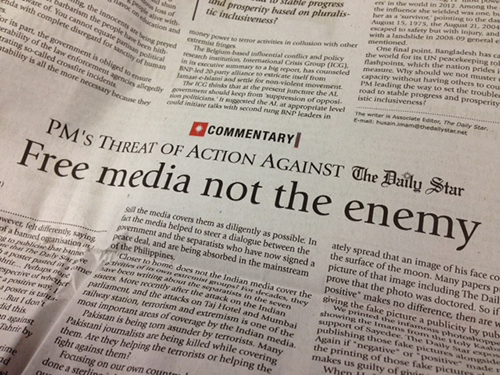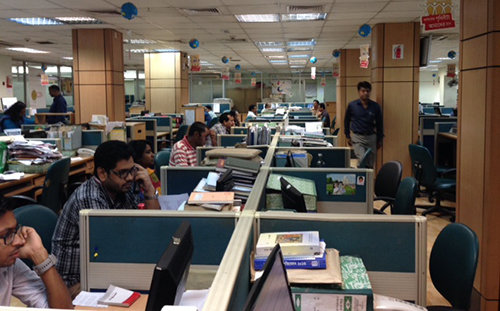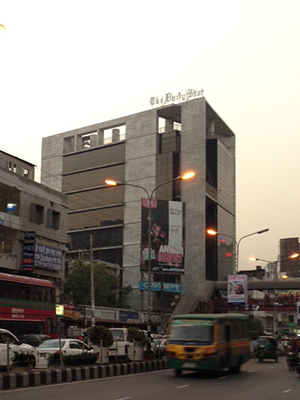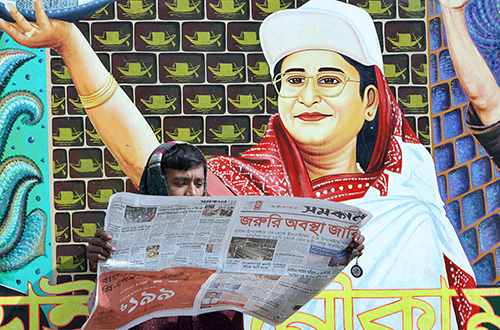Matiur Rahman Chowdhury has been the host of “Frontline,” a popular Bangla-language news show, for five years. Aired live three times a week, the show gained notoriety for bringing politicians, members of civil society, and journalists together to discuss current affairs. Chowdhury distinguished himself from many of his counterparts with his soft-spoken but firm demeanor as he led his guests in substantive discussion, rather than presiding over talking heads trying to drown one another out. At a time when much of the broadcast media in Bangladesh has become muted, talk shows like Chowdhury’s were one of the last spaces for critical news coverage.
Last month “Frontline” was suspended. Officially, the channel’s chairman cited “technical problems” that would temporarily halt the show, but journalists I spoke to during a trip to Bangladesh in February for the Committee to Protect Journalists, offered a contrary account. Several journalists, including Chowdhury, claimed authorities were behind efforts to suspend the show for political reasons. In the weeks leading up to the shutdown, authorities allegedly interfered by telling the privately owned broadcaster BanglaVision what guests would be allowed on its talk shows and what anchors it should remove, reports said. But Chowdhury refused to take orders.
More than six weeks later, the show remains off air. Its absence is a sign of the pressures faced by Bangladesh’s independent media amid a backdrop of political turbulence.
Sheikh Hasina, who heads the ruling Awami League, returned to power in January 2009 after defeating her political nemesis Khaleda Zia, leader of the Bangladesh Nationalist Party (BNP). The two women, often labeled “Battling Begums” by the press, have alternated in ruling the country since 1990, when a 15-year period of military rule ended. Hasina’s re-election last year, which was boycotted by the BNP and other parties, has added to the political drama. Hasina’s opponents claimed the election lacked legitimacy, and called for her to step down to allow a caretaker government to hold fresh elections, according to news reports.

Since then, the political climate has worsened, several journalists told me. “The parliament no longer has a check on the government as there is no real opposition. As for the judiciary, the lower courts are under the thumb of the government. And there are no real checks and balances within the parties, making Hasina and Zia extremely powerful,” said Mahfuz Anam, editor of the privately owned The Daily Star, one of Bangladesh’s most widely circulated English dailies. “The media exists to rein in these powers.”
After targeting the opposition press and virtually eliminating the political opposition from the corridors of power, one of the last standing institutions that can challenge and criticize Hasina’s government is the independent press. In Bangladesh, that comes mainly in the form of televised news and newspapers. TV remains the most popular medium, and vernacular papers–often diverse and politically polarized–also boast large readership, according to the BBC.
On the eve of my arrival, an op-ed in the independent Prothom Alo, one of the country’s most widely read Bangla-language dailies, said: “The government has thrown its constitutional obligations and responsibilities to the wind. It is behaving like an autocratic police state. The rulers are trying to annihilate the opposition by completely curtailing their constitutional political rights, arresting the opposition leaders and activists en masse, suing them at random and carrying out extrajudicial killings in the name of crossfire. Instead of the crisis being resolved, it is deepening further.”
The morning I arrived in Dhaka, the BNP announced a nationwide hartal, or strike, that lasted several days. Often, these strikes are marked by shutdowns of parts of the city or country, and are accompanied by violent demonstrations. During this one there were daily reports of bus bombings and street violence. The U.S. State Department issued warnings advising Americans in Dhaka to confine themselves to certain slivers of the city.
Journalists I met during this tense period said it highlighted the pressures they faced. “Our nation is divided,” said Tipu Sultan, a correspondent for Prothom Alo and recipient of CPJ’s 2002 International Press Freedom Award. “Those not supporting the Awami League are in the line of fire.”

Over breakfast with Prothom Alo‘s editor, Matiur Rahman, he described the challenges for his paper, which also publishes online in Bangla and English. “The climate is not at all friendly for journalism. The current government thinks independent media is working against it,” Rahman said. He claimed that his staffers are often followed by intelligence agents.
Rahman provided me with a document listing dozens of cases filed against him and his staff from various parts of the country in recent years, and which range in allegations of defamation to contempt of court. Rahman explained that the draft language in the complaints was often similar, and that the petitioners were almost always state lawyers, Awami League supporters, or members of the intelligence agency.
The recent troubles of Dhaka-based British journalist David Bergman, whose conviction CPJ reported on in December 2014, reflect this pattern. “The government is looking for opportunities to take legal action,” Bergman told me. “The government can argue it’s the courts that are doing this, not them.” Bergman is a correspondent for the privately owned English-language daily New Age, and also writes a blog, Bangladesh War Crimes Tribunal, which provides critical reporting on the domestic court dealing with war crimes from Bangladesh’s war for independence in 1971. After his conviction for contempt of court over his critical reporting, Bergman said he was ordered to pay a 5,000 taka (US$65) fine or serve seven days in prison. He paid the fine.
During my visit, dozens of individuals–activists, academics, and other professionals–who had signed a statement of concern over Bergman’s conviction and called for reform of the contempt law, were forced to issue unconditional apologies or appear in court. In January, the International Crimes Tribunal asked the signatories “to explain the contents of the ‘statement’ they allegedly made and their conduct,” according to reports. A decision by the court is expected in April.
Over the past two years CPJ has documented how Hasina’s government has, in effect, silenced the opposition press. In April 2013, Mahmudur Rahman, a pro-opposition editor of the privately owned daily Amar Desh, was arrested on charges of publishing false and derogatory information that incited religious tension, as well as charges of sedition, and unlawful publication. Rahman has been behind bars for almost two years, while his trial plays out. In May 2013, police took control of the studios of Diganta TV and Islamic TV, forcing the channels to shut down for allegedly airing misleading information. Both channels, which are pro-opposition in their coverage, remain off air.
The government also introduced a broadcast policy last year prohibiting content that may tarnish the image of its institutions, and making it mandatory to broadcast programs it deems to have national importance, such as speeches by government leaders. While the policy has not yet been enforced, according to the journalists I met, it is indicative of the government’s desire to control the message.
That desire is also evident in the arrest in January of Abdus Salam, the owner of the privately owned Ekushey TV, on trumped-up charges. The channel found itself in hot water after airing a speech by Zia’s exiled son, Tarique Rahman, who serves as senior vice chairman of her party in London. In the speech, Rahman called for the toppling of the Hasina-led government, reports said.

And, in parliament on February 18, Hasina threatened unspecified action against The Daily Star after it published a photograph of a poster circulated in the capital by the banned Islamist group Hizb-ut-Tahrir. The photograph was accompanied by the headline: “Fanatics raise their ugly heads again.” The caption read, in part: “Taking advantage of the current political crisis in the country accompanied by wanton violence, banned extremist Islamist organisation Hizb-ut-Tahrir published and pasted posters in the capital in an attempt to foment unrest within the armed forces.”
Hasina accused the newspaper of patronizing the radical group and promoting its message. “We will move against those who help the Hizb-ut-Tahrir by publishing their posters in the paper,” she said on the floor of parliament, according to reports. “I don’t care whether they have written positively or negatively but by blowing up the visual image of this nondescript poster…which would have attracted no attention, the paper has helped the radical cause.”
Two days later, Anam, the paper’s editor, wrote in a front-page op-ed, “We want to unambiguously state that the prime minister’s statement is ill advised, and no free and independent media will survive in Bangladesh if what has been said is implemented.”
Shortly after Hasina’s speech, her son, Sajeeb Wazed, who serves as Information and Communication Technology Affairs Adviser, demanded Anam’s arrest in a public statement he posted on Facebook, according to news reports.
The Information Ministry released a statement at the end of February, denying the government interferes with the press.
I had spoken to Anam just before Wazed demanded his arrest. During our meeting in his Dhaka office, Anam said he was concerned not just about pressure from the authorities, but also for the overall climate for press freedom. “Over the past year, the media has gone into a mode of self-censorship,” Anam told me. “The government has become totally intolerant to critical voices.”
The intolerance extends beyond the government. Shortly after my departure, Bangladeshi-American bloggers Avijit Roy and Rafida Ahmed Bonna were attacked by unidentified assailants while visiting Dhaka, leaving Roy dead and his wife, Bonna critically injured. Roy was reported to have been an outspoken critic of Islamic fundamentalism and had written on secular and progressive issues. One month on, his family expressed concern in news reports that little progress has been made in bringing his killers to justice. His murder points to a pattern of violence by Islamists against bloggers and critics commenting on religion.
“This is the Orwellian world we are living in,” Anam told me.
[Reporting from Dhaka]
